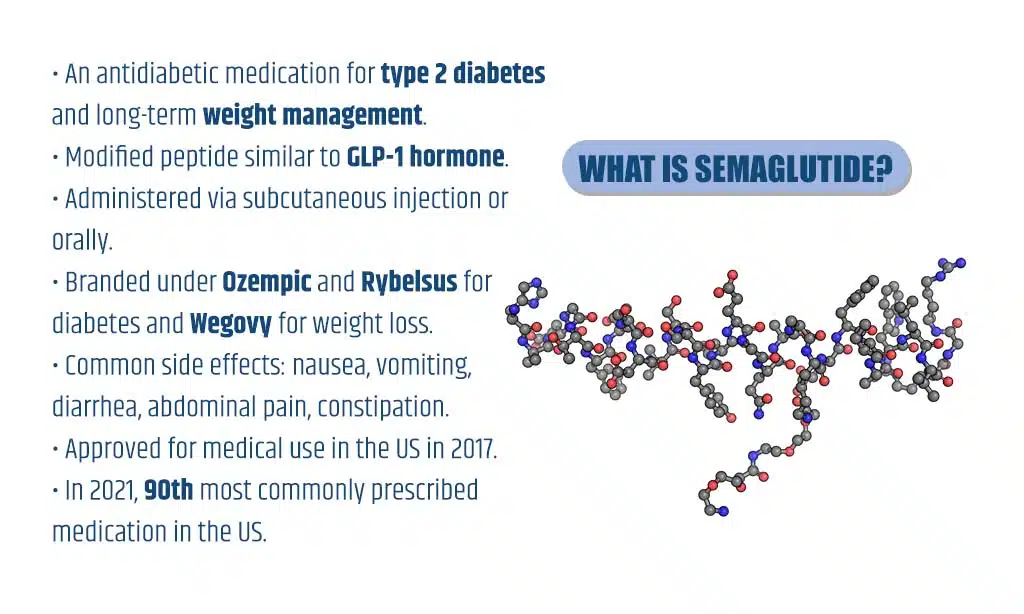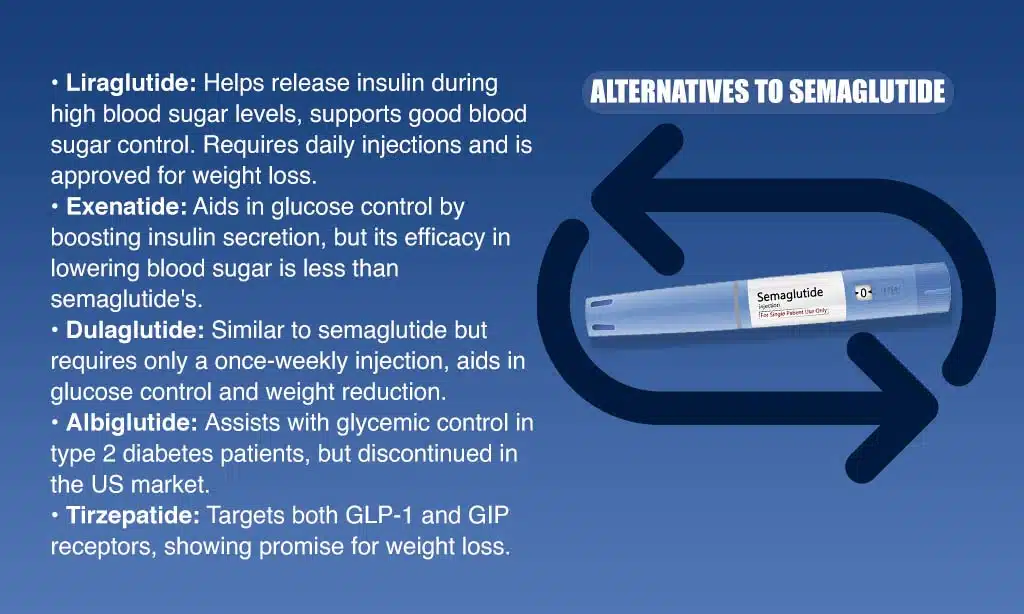Finding the right path to weight loss and managing diabetes can feel like a never-ending battle. With so many options, knowing what works best for your body can be overwhelming. One name you might have heard in this search is Semaglutide—a medication that’s been making waves for both weight management and diabetes care.
In 2021, the U.S. Food and Drug Administration (FDA) gave the thumbs up to Semaglutide for chronic weight management in adults who are obese or overweight. This approval marks a major step forward, offering new hope to individuals striving for healthier lives.
Our article will take you through how Semaglutide could be a game-changer in your journey toward achieving your health goals. It reveals the potential benefits—and yes, the risks—of turning to this treatment option.
Let’s get started on shedding light on something that might just work for you.
What is Semaglutide?

The FDA said yes to semaglutide for helping with chronic weight management in 2021. Before that, in 2017, it got approved for treating type 2 diabetes.
This drug acts like GLP-1, a hormone your body makes naturally that controls blood sugar and how hungry you feel. When you take semaglutide, it helps your pancreas release the right amount of insulin when your blood sugar goes up.
Insulin is what your body uses to keep blood sugar levels healthy. Semaglutide also slows down how fast food leaves your stomach and makes you feel fuller longer after eating less food.
This can lead to losing weight because you eat less and use more of the fat stored in your body for energy.
How Semaglutide works?

Mechanism of action
Semaglutide works like a key that fits into a special lock in our body. This lock is called the GLP-1 receptor, found mostly in areas important for controlling blood sugar and hunger.
When semaglutide finds this lock and turns it, two main things happen. First, it tells the pancreas to release insulin only when blood sugar levels go up, such as after eating. Insulin helps lower blood sugar by allowing it to enter cells where it can be used for energy.
At the same time, semaglutide slows down how fast food leaves the stomach and sends signals to the brain saying we are full. These actions help control appetite and reduce food intake, leading to weight loss in many people.
Unlike other diabetes medicines that work no matter what blood sugar levels are, semaglutide’s effects depend on blood sugar being high first.
This smart approach means less risk of low blood sugar or hypoglycemia—a common worry with some diabetes treatments—and helps with weight management, making it an exciting option for those struggling with obesity or type 2 diabetes.
Echoing these traits shows why GLP-1 receptor agonists like semaglutide have gained attention not just for managing diabetes but also aiding notable weight loss efforts among eligible candidates.
Impact on glucose control
Semaglutide helps people with type 2 diabetes control their blood sugar levels better. This drug works with the body to release insulin when blood sugar is high. Insulin is a hormone that lowers blood sugar.
People taking Semaglutide have seen improvements in their glycemic control. This means their long-term blood sugar levels get better.
Studies show that using Semaglutide can lead to lower risks of heart problems and other issues linked to high blood sugar, like stroke or diabetic retinopathy, which can harm your eyesight.
Managing diabetes well reduces these dangers and helps keep your heart and eyes healthy.
Impact on appetite and satiety
This medication talks to your brain to help you feel full faster. It sends strong signals that tell your body it’s had enough food, leading to eating less. This magic works because the drug interacts directly with areas in the brain involved in appetite control.
These areas receive a message loud and clear: stop eating sooner than usual.
People using this treatment find they want smaller meals and think about food less often. It’s like having an inner coach helping manage how much you eat by boosting feelings of fullness and reducing hunger pangs.
With fewer calories coming in, weight loss becomes more achievable, supporting both waistline goals and health improvements related to diabetes management and obesity treatment.
Semaglutide for Weight Loss
Semaglutide has shown promise in helping people shed pounds. Studies reveal those using it as part of their weight management plan often see notable weight reduction. This breakthrough comes from its ability to make you feel full longer and eat less, making it a strong ally in the battle against obesity.
Dive deeper into how this medicine is changing lives by cutting down on excess weight for a healthier tomorrow.
Clinical trial results
Understanding the impact of Semaglutide on weight loss and diabetes management requires a close look at the clinical trial outcomes. These trials reveal how effective Semaglutide can be for patients struggling with these health issues. The data below showcases results from two important studies: STEP 1 and STEP 3 trials. Both play a crucial role in our understanding of Semaglutide’s benefits.
| Trial Name | Duration | Average Weight Loss | Comparison |
|---|---|---|---|
| STEP 1 | 68 weeks | 14.9% | 2.4% with placebo |
| STEP 3 | 68 weeks | 16.0% | – |
Here’s a look at what this data tells us:
– STEP 1 trial focused on adults with obesity or overweight. Half of these folks lost 15% of their body weight after 68 weeks. This result is important when compared to a 2.4% weight loss with a placebo.
– STEP 3 trial revealed that participants could lose 16.0% of their body weight at week 68. This finding supports Semaglutide as a strong player in weight management.
These outcomes highlight the strong potential of Semaglutide not just as a diabetes medication but also as a weight loss aid. Patients in these trials saw marked improvements, pointing to Semaglutide’s effectiveness. Its role in managing type 2 diabetes and helping with weight loss has become clearer thanks to these studies.
Comparison with other weight loss medications
When exploring weight loss solutions, Semaglutide stands out for its effectiveness. But how does it measure up against other options? Let’s take a closer look.
| Medication | Weight Loss Achieved | Dose | Side Effects |
|---|---|---|---|
| Semaglutide | 15.8% from baseline | 2.4 mg | Nausea, diarrhea, and vomiting |
| Liraglutide | 6.4% from baseline | Varies | Nausea, headache, dizziness |
| Orlistat | 2.6-5.8% over placebo | 120 mg | Gastrointestinal issues |
| Phentermine-Topiramate | 9.8% from baseline | Varies | Dry mouth, tingling, constipation |
Semaglutide shines with a bigger weight loss percentage—showing a clear edge over other options like Liraglutide, Orlistat, and the Phentermine-Topiramate combo. Its higher dose of 2.4 mg certainly plays a part in its success. Side effects are a part of the journey, with issues like nausea and vomiting being more common.
Our comparison focuses on the essential facts. Semaglutide’s standout feature is its potent ability to cut down weight, which is notably higher than its peers. Each medication has its own side effect profile, but the choice becomes clearer for those prioritizing weight loss outcomes. Semaglutide, with its impressive stats, offers a compelling option for many.
Long-term efficacy
Studies like the STEP 5 trial show that semaglutide helps people lose weight and keep it off for up to two years. In this study, those who took semaglutide lost 15.2% of their starting weight after 104 weeks.
This result suggests that with long-term use, semaglutide could be a strong ally in managing obesity.
Yet, if someone stops taking the medication, they might gain back some or all of the weight they lost. This finding emphasizes the importance of continuing treatment alongside diet and exercise for lasting results.
Doctors often advise stopping semaglutide if you don’t lose at least 5% of your body weight after 12 weeks since longer use may not benefit those who don’t respond initially.
Semaglutide for Diabetes Management
Semaglutide stands out as a strong ally for people battling type 2 diabetes. It not only helps control blood sugar levels but also reduces the risk of heart problems tied to diabetes.
Benefits in type 2 diabetes
Approved in 2017 for treating type 2 diabetes, Semaglutide has shown promising results in managing this condition. It helps patients control their blood glucose levels more effectively.
This is crucial because keeping blood glucose within a healthy range can prevent or delay complications related to diabetes. These complications include heart disease, kidney damage, and vision loss.
Studies from the SUSTAIN clinical trial program have demonstrated that Semaglutide not only aids in managing blood sugar but also contributes to weight loss and lowers the risk of cardiovascular events in people with type 2 diabetes.
Managing weight is often a challenge for individuals with this condition, making such benefits particularly valuable.
Moreover, Semaglutide improves cardiometabolic indices—these include measures like blood pressure and cholesterol levels—and psychosocial indices, which can improve overall quality of life for those living with type 2 diabetes.
Effect on glycemic control
Semaglutide helps people with type 2 diabetes control their blood sugar levels. It works by acting on the body’s natural systems to lower high blood sugar. This drug, proven effective in SUSTAIN clinical trials, can also work well with other diabetes medications, making it a versatile tool for managing this condition.
Taking Semaglutide leads to better glycemic control. This means it keeps blood sugar levels more stable throughout the day and night. For someone with diabetes, having steady blood sugar is crucial to avoid health problems and feel good every day.
Reduction in diabetes-related complications
Taking Semaglutide can lead to fewer problems from diabetes. This drug helps prevent serious heart issues like failure, attacks, and strokes. The SUSTAIN 6 trial found it cuts down the chance of these bad heart events happening.
This is great news for people with type 2 diabetes because they are at a higher risk for these problems.
This medication also makes it less likely for you to have other diabetes-related troubles. It works by keeping your blood sugar under control and helping your heart stay healthy. People who take it might not have as many hospital visits or need as much care for their heart and blood sugar levels.
Semaglutide offers a promising way to fight against the complications that often come with diabetes.
Candidate Suitability for Semaglutide
Finding out if Semaglutide is right for someone depends on their health goals and conditions. People with type 2 diabetes or those looking to lose weight might be good fits.
Ideal candidates for weight loss
Choosing the right medication for weight loss can be a game-changer. Semaglutide has shown promising results for many people looking to lose weight. Here are the ideal candidates who might benefit the most from this medication:
- Adults with a body mass index (BMI) of 30kg/m2 or more without any major health issues.
- People with a BMI of 27kg/m2 or more who also have weight-related health problems like high blood pressure, diabetes, or high cholesterol.
- Individuals who have not been able to lose weight through diet and exercise alone and need a boost.
- Those at risk for cardiovascular disease due to obesity, which can lead to heart attacks or strokes.
- Patients with type 2 diabetes looking to manage their blood sugar levels better as well as lose weight.
- Anyone suffering from sleep apnea, where weight reduction could greatly improve breathing patterns during sleep.
- Persons without a history of medullary thyroid carcinoma or multiple endocrine neoplasia syndrome type 2 are contraindicated for Semaglutide use.
Semaglutide works by mimicking an intestinal hormone that tells the brain your stomach is full, helping you eat less and feel satiated longer. This FDA-approved medication has helped many patients see considerable improvements in their waist circumference and overall health when combined with physical activity and a reduced-calorie diet.
Ideal candidates for diabetes management
Managing diabetes requires effective strategies. Semaglutide has become a powerful tool in this fight.
- Patients with Type 2 Diabetes: This group stands to benefit greatly from Semaglutide. It helps improve blood sugar levels by mimicking a hormone that regulates blood sugar.
- People Struggling with Weight Control: Since weight can impact diabetes management, those looking to reduce their weight may find Semaglutide helpful. It lowers hunger, which can lead to less eating and weight loss.
- Individuals with Heart Problems: Patients with established heart diseases find value in Semaglutide. It has shown promise in reducing the risk of major cardiac events, important for those with type 2 diabetes.
- Those Needing Better Blood Sugar Management: For people who haven’t achieved their desired glycated hemoglobin (A1C) levels through diet, exercise, or other medications, Semaglutide offers an alternative solution by improving glycemic control.
- Patients at Risk for Diabetes-Related Complications: If there’s a high risk of complications like heart disease or stroke, Semaglutide may help reduce these risks due to its cardiovascular benefits.
- People With a Family History of Diabetes: Those who have family members with diabetes might see Semaglutide as preventive medicine to manage or delay the onset of type 2 diabetes.
- Patients Looking for Long-term Diabetes Management Solutions: For individuals seeking sustainable ways to manage their condition, Semaglutide can be part of a long-term plan due to its efficacy and safety profile over time.
- Individuals Interested in Minimally Invasive Options: Since Semaglutide is available as a once-weekly subcutaneous injection (Wegovy, Ozempic) or as an oral tablet (Rybelsus), it attracts patients preferring less invasive methods than daily insulin injections.
By addressing these candidates effectively, healthcare providers can develop approaches that suit each individual’s needs and conditions while utilizing the benefits of Semaglutide in managing type 2 diabetes and its associated risks efficiently.
Doctor’s Practical Experience with Semaglutide Injection in Diabetes Management:
Dr. Mohammad Sayem, a renowned medicine consultant in Bangladesh, has prescribed Semaglutide injections to over 1,000 patients, primarily for the management of diabetes. His patients span various age groups, and he has observed significant improvements in their diabetic control after incorporating Semaglutide into their treatment plans.
According to Dr. Sayem, many of his patients have been able to reduce the dosage of other diabetic medications, including insulin, after starting Semaglutide injections at the appropriate dose. This highlights the effectiveness of Semaglutide in managing blood sugar levels and potentially reducing the reliance on multiple medications.
When asked about the side effects of Semaglutide, Dr. Sayem noted that while some patients may experience abdominal issues when they first begin the injections, he has not encountered any severe cases of gastric problems or constipation among his patients taking the medication.
Dr. Sayem’s extensive experience in prescribing Semaglutide injections to a diverse patient population provides valuable insights into the real-world application of this medication. His observations suggest that Semaglutide can be an effective tool in the management of diabetes, offering the potential to streamline treatment plans and improve patient outcomes.
A Patient’s Practical Experience with Semaglutide Injection in Diabetes Management:
In March 2023, as a 35-year-old patient, I (A patient of Dr. Sayem; Mr. Sukanta) began taking Semaglutide injections as per Dr. Mohammad Sayem’s advice. When I began the treatment at the starting dose, I experienced gastric problems. After adjusting my doses for 4 weeks, I experienced diarrhea, vomiting, regular constipation, and severe gastric issues. Every day, my bowel movements were not normal.
Concerned about the side effects of semaglutide, I consulted several doctors in addition to Dr. Sayem. While attending an international conference in September, I had to visit Apollo Hospital in Chennai, India, due to a serious vomiting problem. The doctors there diagnosed me with a gallbladder polyp and grade-I fatty liver. The gastro-liver and medicine specialists prescribed medication and advised me to continue it for 3 months.
Unfortunately, I experienced the same issues again in November 2023 after returning home to Bangladesh. I underwent a whole abdomen ultrasound and MRI, which revealed that my gallbladder polyp was increasing in size. Although I reduced the dose of Semaglutide as per my doctor’s suggestion, my bowel movement problems worsened.
A surgeon advised me to prepare for cholecystitis surgery due to the gallbladder polyp. I underwent successful surgery on February 19, 2024, at Square Hospital in Dhaka, Bangladesh. While the doctors couldn’t confirm that the side effects of semaglutide directly caused my need for surgery, I personally believe that facing this type of surgery at the age of 35 is unusual, as it is more common in people over 50.
Despite these difficulties, I continue to take Semaglutide injections at a lower dose as my doctor has prescribed. My diabetes and creatinine levels are well-controlled, with an HbA1c of 6.2% and S. creatinine of 1.06 this month. However, I still suffer from regular constipation, and my bowel movements remain unclear even after taking gastric medication.
Adverse Effects and Risks
Taking Semaglutide comes with certain risks and side effects. Some folks might experience nausea or headaches, while more serious issues could also pop up for others.
Common side effects
Semaglutide is a medication many people use for weight loss and diabetes management. Like all medicines, it can cause side effects in some patients. Here’s a closer look at the most common ones:
- Many individuals experience stomach problems such as nausea, vomiting, and diarrhea. These issues usually occur when first starting the medication.
- Constipation is another side effect that might bother some people taking semaglutide.
- Patients often report feeling dizzy or fatigued, which can affect their daily activities.
- Headaches are common too, making it hard for some to focus or work effectively.
- Pain or swelling in the stomach area is not unusual, leading to discomfort and bloating feelings.
- Gallbladder problems, including gallstones or cholelithiasis, have been noted in certain cases.
- Some individuals might notice a reaction at the injection site if using the injectable form of semaglutide.
Understanding these side effects helps patients be better prepared to discuss them with their healthcare providers and manage any symptoms that arise while using semaglutide for weight loss or diabetes management.
Serious risks and contraindications
Taking Semaglutide comes with its share of serious risks and reasons why some people should not use it. For example, those with medullary thyroid carcinoma (MTC) or multiple endocrine neoplasia syndrome type 2 (MEN 2) must avoid this medicine.
These conditions are rare but dangerous types of thyroid cancer. People who already have these health issues could make their condition worse by taking Semaglutide.
Another risk involves diseases linked to the pancreas, such as acute pancreatitis and pancreatic cancer. If someone has a history of severe pancreatic problems, using Semaglutide might increase their chances of getting these illnesses again.
Also, patients with diabetic retinopathy—an eye condition that can lead to blindness—might see their situation get worse with this medicine. Therefore, doctors often recommend against using Semaglutide for individuals facing these health challenges.
Lastly, allergies play a big role in deciding if one can use Semaglutide safely. Those allergic to any component of the drug might experience reactions ranging from simple skin rashes to severe cases like anaphylaxis—a life-threatening reaction needing immediate treatment.
Always consult a healthcare provider before starting on Semaglutide to ensure it’s safe based on personal medical history and current health conditions.
Management of side effects
Managing side effects of Semaglutide is crucial for both patient comfort and treatment success. Here’s how patients and healthcare providers can work together to address these concerns effectively.
- To help the body adjust, start with a low dose of semaglutide and then gradually increase it as your doctor may advise. This approach helps minimize digestive issues like nausea or vomiting.
- Eat small, light meals throughout the day instead of large ones to reduce feelings of nausea. Choosing foods that are easy on the stomach can also prevent discomfort.
- Stay hydrated by drinking plenty of water, which can ease side effects like constipation and help flush out toxins from the body more efficiently.
- Report any severe or persistent side effects to a healthcare professional immediately. This includes symptoms like severe abdominal pain, which could indicate gallbladder problems, or signs of thyroid tumors such as a lump in the neck.
- Follow dietary modifications suggested by your doctor or dietitian closely, especially if experiencing gastrointestinal issues. These changes can improve how well you tolerate Semaglutide.
- If experiencing mild side effects, maintain a lower tolerated dose for a longer period before trying to increase, under the guidance of a healthcare provider.
- Conduct regular retinal screenings if you have diabetes-related eye conditions like diabetic retinopathy to catch any possible worsening early on due to Semaglutide treatment.
By taking these steps, individuals using Semaglutide for weight loss or diabetes management can better manage side effects and continue their treatment with minimal disruptions to their daily life.
Recent Studies about the side effects of Semaglutide:
Recent studies presented at Digestive Disease Week 2024 have linked popular diabetes and weight loss medications, such as Ozempic and Wegovy, to an increased risk of developing stomach paralysis (gastroparesis) and other severe gastrointestinal side effects. These medications contain semaglutide, a GLP-1 receptor agonist known to cause nausea, vomiting, and diarrhea.
Key findings from the studies include:
- University of Kansas Study:
- 0.53% of patients developed gastroparesis, with a 66% increased risk.
- 0.55% developed cholecystitis (gallbladder inflammation), with a 28% increased risk.
- 0.04% experienced drug-induced pancreatitis, with a 350% increased risk.
- 9% had a higher incidence of nausea and vomiting.
- 7.5% showed a higher incidence of GERD.
- Cleveland Clinic Study:
- Increased risk of gastroparesis at various intervals (6, 9, 12, 18, and 24 months) for patients prescribed GLP-1 receptor agonists
- The odds ratio for developing gastroparesis significantly increased from 6 months through 24 months.
- Mayo Clinic Minnesota Study:
- 18% (about 14,660) of patients receiving GLP-1 receptor agonists developed at least one new gastrointestinal symptom suggestive of gastroparesis.
- Gastric emptying scintigraphy confirmed gastroparesis in about one-third of the patients.
These findings emphasize the need for healthcare professionals to closely monitor patients on GLP-1 receptor agonists and inform them about potential risks. Further research is essential to fully understanding the long-term impacts of these medications and developing strategies to mitigate their adverse effects.
Off-Label Use and Differences in Semaglutide Formulations
Exploring the different faces of Semaglutide, such as Ozempic, Wegovy, and Rybelsus, sheds light on how this medication serves various needs. From treating diabetes to aiding in weight loss, each version has its role.
But stepping into the world of off-label use opens a new chapter. Doctors sometimes prescribe these drugs for reasons not listed on the label. It’s vital to tread carefully here, considering legal and safety guidelines, to avoid unwanted surprises.
Dive deeper into this topic to understand how Semaglutide adapts to meet diverse health challenges!
Ozempic, Wegovy, and Rybelsus
Ozempic and Rybelsus are both used for managing type 2 diabetes, while Wegovy has been approved specifically for weight loss. These medications contain semaglutide, a substance that mimics a hormone to control blood sugar levels.
Ozempic is taken through an injection once a week, and Rybelsus is the pill form you can take daily. They work by helping your pancreas release insulin when your blood sugar is high and by lowering how much sugar your liver makes.
Wegovy works differently because it targets weight loss at a higher dose of 2.4 mg compared to what’s used for diabetes in Ozempic and Rybelsus. This medication helps people feel full longer after eating smaller amounts of food, reducing their total appetite.
Studies show that taking Wegovy can lead to noteworthy weight loss over time when combined with exercise and a healthy diet.
All three medications come from Novo Nordisk, showing promising results in clinical trials for both glucose control in diabetics and weight reduction in obese individuals. They share common side effects like nausea and constipation but offer new hope for those struggling with these chronic conditions.
People interested should talk with their doctors about which option might suit them best based on their health needs.
Legal and safety considerations for off-label use
Doctors sometimes prescribe medicines for reasons the FDA has not approved. This is called off-label use. It can be helpful but also comes with risks and legal issues to think about.
Before trying Semaglutide this way, you should talk to your healthcare provider.
The FDA approves drugs like Semaglutide for specific uses based on safety and effectiveness data from clinical trials. When a medicine is used off-label, it might not have gone through the same testing for that new use.
This means there could be unknown side effects or risks.
Healthcare providers recommend talking first before starting any off-label treatment. They know about the latest research and can guide you to what’s best for you. Always make sure to ask questions and understand why a certain medication is being suggested for an unapproved purpose.
Alternatives to Semaglutide
If Semaglutide isn’t right for you, there are other paths to consider. Some people might go for different medications that act like GLP-1 receptor stimulators. Others might try pills that aren’t related to diabetes at all but still help with losing weight.
Then, there’s the choice of not using medicine and focusing on diet changes and exercise instead. Every option has its own set of pros and cons, so it’s a good idea to talk it over with a doctor.
They can help find the best fit for your health goals. Keep exploring to learn more about each alternative!
Other GLP-1 receptor agonists
Semaglutide is not the only option available when it comes to managing weight and diabetes. Several other GLP-1 receptor agonists offer similar benefits and are worth considering.
- Liraglutide (Victoza, Saxenda): This drug helps the body release insulin when blood sugar levels are high, which supports good blood sugar control. Unlike semaglutide, Liraglutide requires daily injections. It’s also approved for weight loss under the brand name Saxenda.
- Exenatide (Byetta, Bydureon): Available in two forms—a twice-daily injection (Byetta) and a once-weekly injection (Bydureon)—Exenatide aids in glucose control by boosting insulin secretion. Its efficacy in lowering blood sugar isn’t as strong as semaglutide’s.
- Dulaglutide (Trulicity): Similar to semaglutide but requiring only a once-weekly injection, Dulaglutide helps with glucose control and has shown promise in weight reduction efforts as well. Its ease of use makes it a popular choice among patients.
- Albiglutide (Tanzeum): Although less common, Albiglutide is another once-weekly injectable option that assists with glycemic control in type 2 diabetes patients. It was discontinued in the US market but remains an example of GLP-1 receptor agonist therapy.
- Tirzepatide (Mounjaro): Although not strictly a GLP-1 receptor agonist—it targets both GLP-1 and GIP receptors—Tirzepatide has shown great promise, particularly for weight loss, outperforming many solely GLP-1 based medications in clinical trials.
Each of these alternatives shares a common mechanism of action with semaglutide but differs slightly in terms of dosage form, frequency of administration, and effectiveness levels across different patient populations. They offer valuable options for individuals looking for treatment for type 2 diabetes or weight management who may need or prefer something other than semaglutide.
Non-pharmacological interventions
Managing weight and improving health don’t always rely on medication. Lifestyle changes play a crucial role in achieving these goals. Here are some effective non-pharmacological interventions:
- Intensive lifestyle intervention (ILI) – This method combines counseling with physical activity to promote weight loss. Studies have shown that ILI can result in a 7-8% reduction in weight after one year.
- Behavioral treatment – Focusing on changing eating habits and exercise behaviors, this approach leads to modest weight losses of 4-5%. It involves setting realistic goals and tracking progress over time.
- Dietary modifications – Adopting a healthy eating plan that reduces calorie intake but is still nutritious supports weight loss and diabetes management. Including foods high in fiber and low in sugar helps control hunger and blood sugar levels.
- Physical activity – Regular exercise, such as walking, cycling, or swimming, can help burn calories and improve heart health. Just 30 minutes of moderate activity most days of the week can make a big difference.
- Stress management – High stress levels can lead to overeating and decreased motivation for physical activity. Techniques like mindfulness, meditation, or yoga can help manage stress effectively.
- Sleep hygiene – Getting enough quality sleep is vital for weight management and overall health. Poor sleep can affect hormones that regulate appetite, making it harder to lose weight.
- Support groups – Joining a group for people with similar health goals provides encouragement and accountability, which are crucial components of successful long-term behavior change.
- Education – Learning about nutrition, exercise, and how to read food labels empowers individuals to make healthier choices every day.
These interventions highlight the importance of adopting a comprehensive approach to health, focusing on more than just medication for managing conditions such as obesity and diabetes.
Patient Experiences and Preferences
Hearing from people who have used Semaglutide shows us the real impact it can have on lives.
Case studies
Patients at Southwest Family Medical showed great results with semaglutide. They lost a lot of weight. This shows that the medication can help people slim down. Another study, called STEP trials, also found that patients dropped many pounds.
Some folks noticed they gained weight back after they stopped taking the medicine. This tells us it’s crucial to keep using it for lasting effects. These stories from real people let us see how semaglutide works in everyday life, not just in tests or labs.
Patient-reported outcomes
People who use Semaglutide for weight loss or diabetes management often share their experiences. They talk about what they like and don’t like. Most say that stomach problems are a common side effect.
They also discuss how the drug helps them eat less and control their blood sugar better.
Many choose Semaglutide because they can take it only once a week, and it is more effective than other drugs. Yet, 68% of them pay for it out of their pockets since insurance doesn’t always cover the cost.
This information helps doctors understand what matters to patients beyond just the medical results.
Future Prospects and Ongoing Research
Exciting new studies and trials are on the horizon, exploring how semaglutide can help more people in ways we haven’t seen yet. Stay tuned for what’s next!
Upcoming trials and studies
Researchers are always looking for better ways to manage weight and diabetes. They have several interesting studies on the horizon that involve semaglutide.
- The SELECT study (NCT03574597) focuses on heart health. It looks at how semaglutide might help people with heart issues avoid major events like heart attacks or heart failure.
- Another trial, the FLOW study (NCT03819153), checks semaglutide’s effects on kidneys in folks with type 2 diabetes. It aims to find out if this medication can prevent serious kidney problems.
- Scientists are also exploring oral semaglutide for managing weight. This form would be easier to take than injections, making it a more appealing option for many patients.
- Ongoing research is looking into how semaglutide impacts sleep apnea, a condition many overweight people suffer from. Might this medication make it easier for them to breathe at night?
- Some studies are focusing on how semaglutide affects blood sugar levels over long periods. These trials will give doctors better insight into its role in diabetes management.
- There’s curiosity around whether semaglutide can prevent or delay type 1 diabetes in high-risk individuals. Early detection and treatment could make a big difference.
- Researchers are keen to understand if combining semaglutide with other medications, like SGLT2 inhibitors or oral antidiabetic drugs, offers greater benefits without increasing risks.
- The impact of semaglutide on obesity-related conditions such as high blood pressure and gallbladder disease is another area under investigation.
- Trials are examining if reducing appetite with semaglutide leads to sustainable eating habits and long-term weight loss.
- Finally, scientists are studying potential side effects more closely, including allergic reactions and thyroid problems, to ensure the drug’s safety profile remains strong.
These upcoming trials could change how we approach weight loss and diabetes care, offering new hope through cutting-edge treatments.
Potential new indications
Doctors are now looking at semaglutide for chronic kidney disease. This could be a big deal because many people suffer from this illness. It affects how well the kidneys work, cleaning the blood and removing waste.
Semaglutide might help these patients by improving kidney function.
Studies also suggest that semaglutide could be useful for more groups of patients. Scientists want to know if it can help people who have not been studied much before in semaglutide trials.
They will do more research to make sure it is safe and works well over time for these new uses.
Takeaways
Semaglutide shows promise for folks wanting to lose weight or manage diabetes. Blood sugar levels and appetite are both addressed by this medication, which has received approval from experts like the U.S. Food and Drug Administration.
With strong results from clinical trials, many see it as a hopeful choice. Yet, it’s not perfect—side effects range from stomach troubles to more serious concerns. Plus, not everyone may fit the bill for its use due to health conditions or other factors.
As research continues, semaglutide stands out in the fight against obesity and diabetes but reminds us to weigh the benefits against the risks carefully.
References:
1. https://www.uclahealth.org/news/article/semaglutide-weight-loss-what-you-need-know
2. https://swfamilymedical.com/pros-cons-semaglutide-for-weight-loss/
3. https://www.ncbi.nlm.nih.gov/pmc/articles/pmc9807016/









































